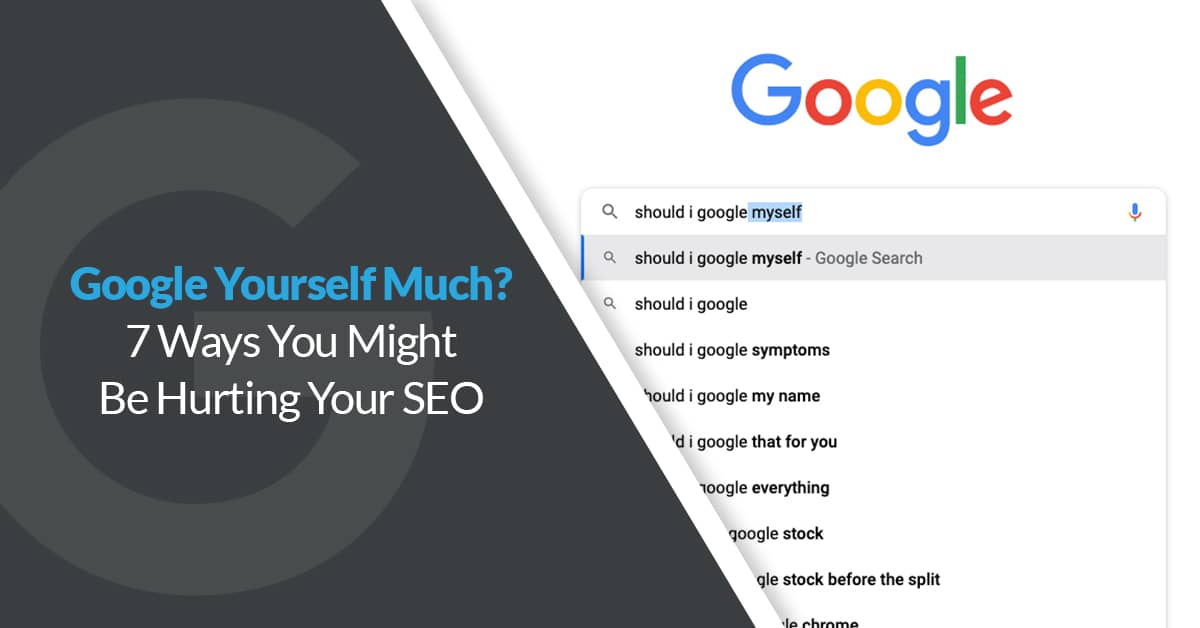How Googling Yourself Can Hurt or Help Your SEO
9 Minute Read
Everybody does it. Whether it’s searching your personal name or business name, it’s basic digital curiosity to want to know where you rank in search results on Google and other search engines.
Business owners and marketers also search high-value keywords to see where they rank versus how competitors rank in online search. These searches are foundational for SEO, enabling you to see how your business performs compared to other businesses in your market and your industry.
However, these simple searches can have a negative effect on your rankings if you don’t approach the search the way your customers do. Keep the following in mind to get the SEO insights you need without self-sabotaging your search marketing:

Why Googling Yourself Is Bad for Your SEO
Google places a premium on discerning user intent. The massive amount of data collected by Google from user searches is fed into its algorithms and machine learning programs to deliver the most relevant search results.
What Google’s automated processes do not and cannot account for is the nuance of people searching for purposes of competitive analysis. To Google, high-level keywords (i.e., “solar energy company,” “Columbus personal injury lawyer,” etc.) are searched so users can find the businesses that meet their wants and needs – not so business owners and marketers can scope out the competition.
The disconnect between your intent when you “Google yourself” and how Google reads that intent can skew the search results. It’s the SEO equivalent of poisoning your own well. Bad habits when Googling yourself hurt the following aspect of your SEO and/or can give your competition a bump:
1. Organic Click-Through Rate
Google assesses a number of different factors in determining what results should be delivered to people who search for a given keyword or phrase. A page with a high click-through rate (CTR) from organic SERPs for a particular keyword sends a strong signal to Google that the page in question is highly relevant to the user’s search.
High CTR correlates strongly with better SEO ranking. A study by SISTRIX found that the pages ranked first in Google SERPs have a click-through rate of nearly 30% on average.
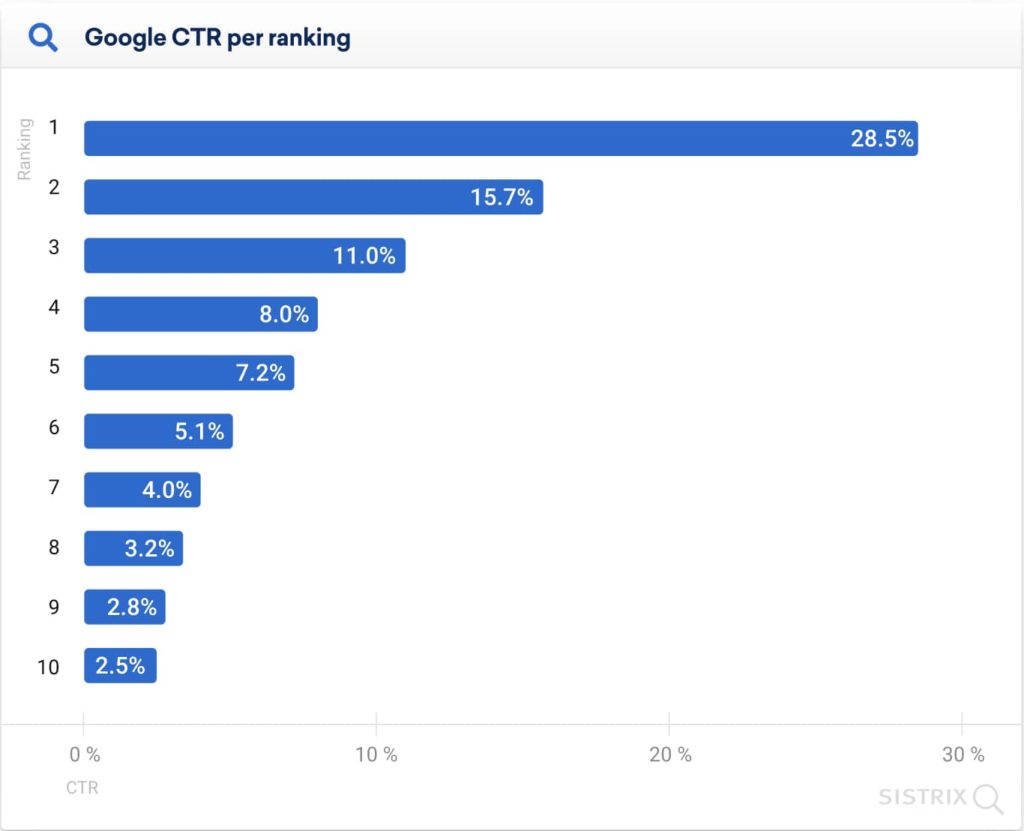
Now, what does this mean if you Google yourself? Say you routinely search one of your most valuable target keywords, and you usually end up clicking on one or more of your competitors’ results. Every time you do this, you are telling Google that that competitor’s page is a better result for the keyword in question than yours. If this pattern is repeated by you, the members of your team, your agency, and consumers as a whole, the competitor will consistently rank ahead of you.
2. Bounce Rate
In addition to organic CTR, Google assesses a number of site-level ranking factors to determine if a page is worthy of being ranked for a given keyword. Problems with usability, poor performance on mobile, and other issues generally harm a website’s ability to rank.
Of course, Google can’t “see” these problems the way a human user can. Instead, Google relies on signals sent by the user to determine if the experience on the website is positive or negative. When a user leaves a website after landing on a particular page without visiting any additional pages, this is called a “bounce.”
As a rule, high bounce rate correlates strongly with lower rankings. This is because Google sees a high proportion of bounces as a signal that the page or the site as a whole offers an inferior experience.
While bounce rate is not technically a ranking factor in itself, it is nonetheless an important SEO consideration. Semrush identifies bounce rate as the fourth most important ranking factor (behind direct website traffic, time on site, and the number of pages visited per session).
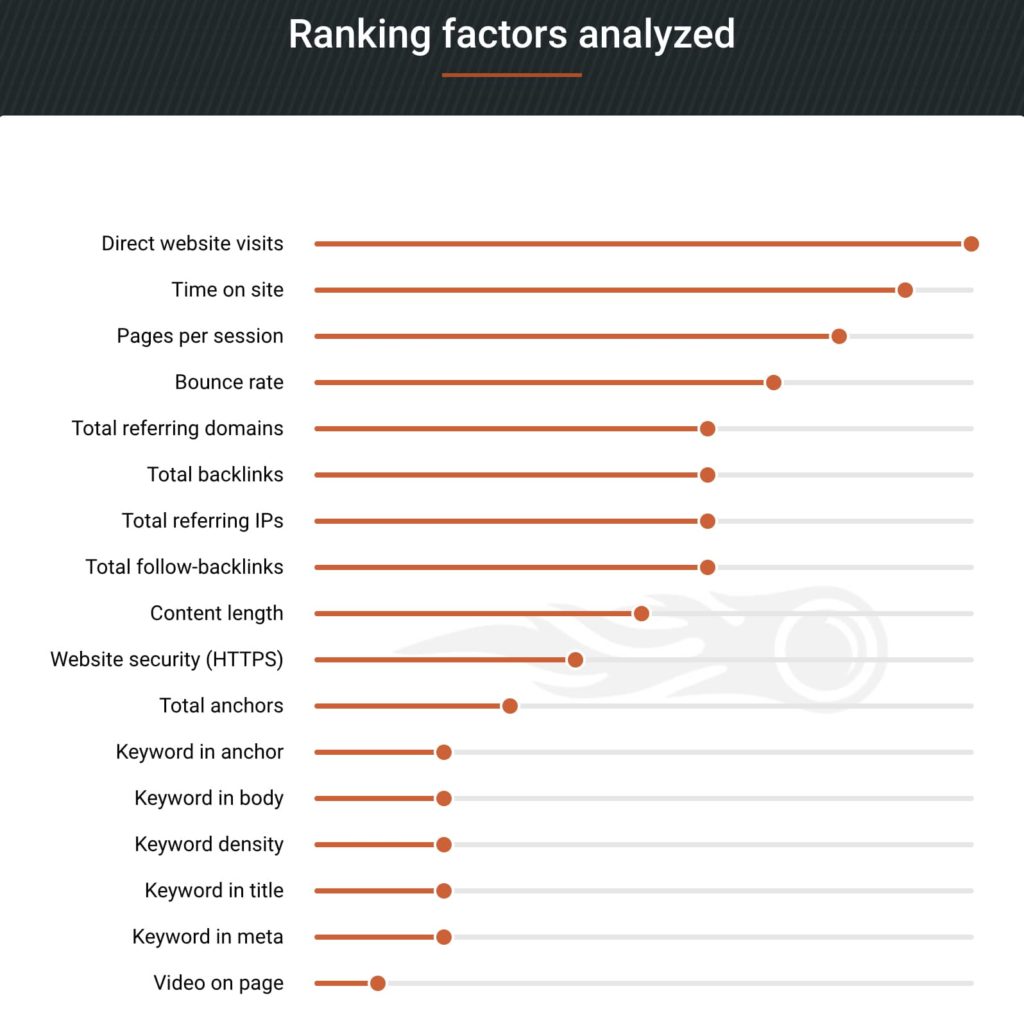
When people Google themselves, they might click to their own website just to get a glimpse of the page that’s ranking (and they might not even go this far). But, when they click to a competitor’s website, they often peruse multiple pages to “see what they’re up against.”
That quick click to your website followed by hitting the back button or closing the tab increases your bounce rate. Delving into a competitor’s website, meanwhile, will lower their bounce rate. Generally, Google will assign a negative SEO value to the former action and a positive SEO value to the latter.
NOTE: Google Analytics 4 does not include the bounce rate metric. Instead, marketers and webmasters will have to rely on the new “engaged sessions” data to see how users interact with the website.
Read more about the upcoming switch to Google Analytics 4 and what you need to know.
3. Dwell Time
Dwell time refers to how long users stay on the page after arriving from SERPs. Like bounce rate, dwell time is another metric that correlates with a number of user interaction and engagement metrics Google uses to suss out the quality of a page. WordStream assessed its own content and found that 30 of its 32 top-performing pages in organic search all had dwell times way above the site’s average time on page.
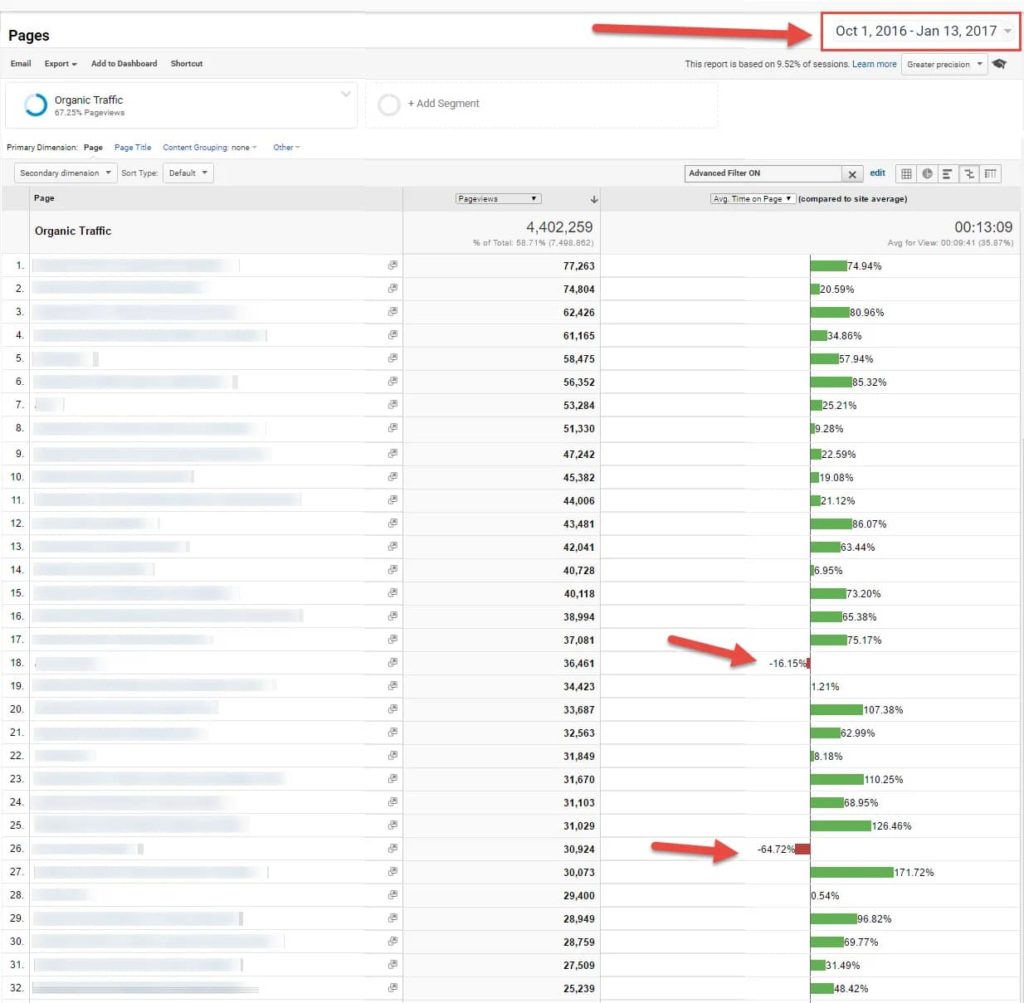
Pages that users spend a lot of time on after arriving from a search will send a strong signal to Google that the page is a highly relevant result for the given query.
As mentioned above, marketers and business owners who Google themselves tend to give short shrift to their own pages in search results while (dare we say it?) obsessing over what the competition is doing. If you click on a competitor’s page from search results and spend half an hour reading every word on the page to see what they have that you don’t, you’re not doing your own SEO any favors.
4. Relevance
Personalized search results are the norm. Google serves different results to users based on personal characteristics such as:
- The user’s geographic location
- Previous browsing and search history
- Whether the user is signed into a Google account
- Variations in keywords and phrases
- And more
Because of the wide variations in user search habits, there is really no way to get an “objective” picture of what page is ranked first for a given keyword. Googling yourself will not help because the results you see are tailored to the individual user based on the factors listed above.
A customer across town or even a few blocks away will see different results than you do. What’s more, they will approach the search differently because they may be unaware of the specific terms that can connect them with the right product or service.
Make no mistake: Ranking first for search terms related to your business is important. However, fixating on first-page rankings for select keywords to the exclusion of other indicators of success (such as click-through rate, leads, and sales) turns SEO into a vanity project more than an effort to maximize your visibility to customers.
Read More: Keywords – How Much Is Too Much?
5. Proximity
In addition to relevance to the user’s query, Google will also heavily favor results that are in close proximity to where the user is located. Research by Semrush shows that the Google Maps results for most industries display businesses that are less than 1 mile away from the searcher.
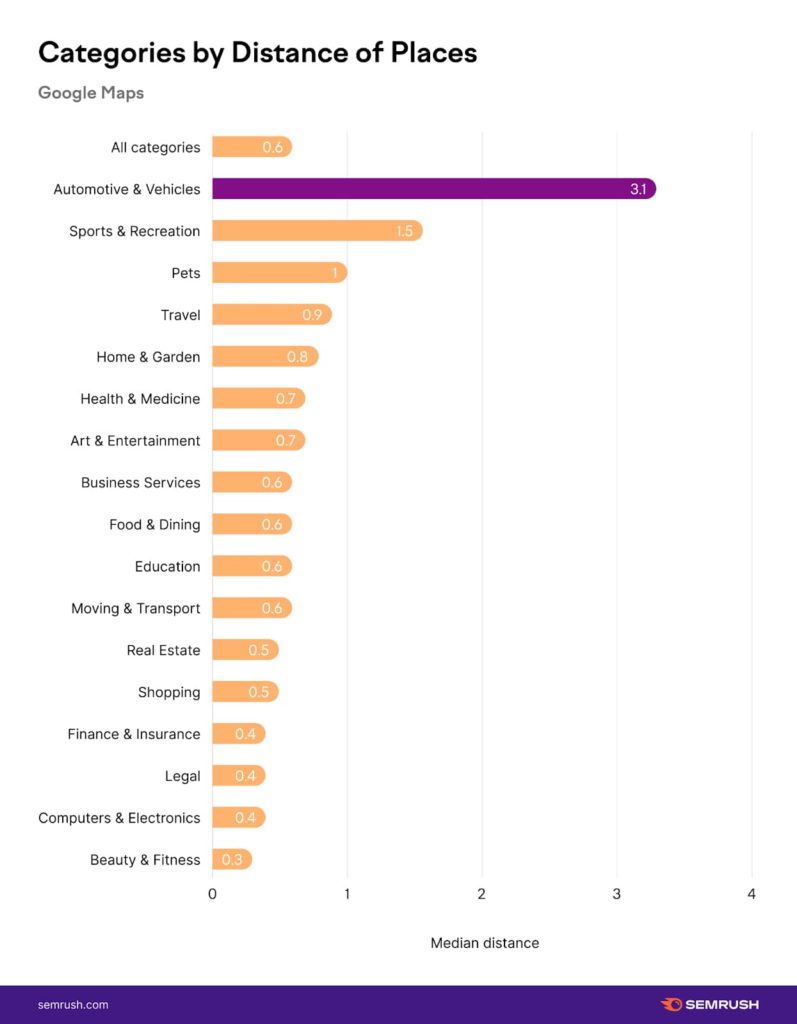
Organic search results are similarly affected by proximity. The SERPs you see when you Google yourself are different from what other users see because they could be located across town, elsewhere in the state, or even in another country.
Because proximity is such a huge factor in local and organic search, you cannot reliably gauge your rankings by Googling yourself. The difficulty is especially pronounced if you only search from one location (such as your office or your home), as you will have no way to make an accurate comparison between what you see in a narrowly defined geographical area compared to what customers in many different areas see in the search results.
6. Prominence
Prominence refers to the online “footprint” of your business. An extremely simple search devoid of virtually all context (ex: “burgers”) will generally show nationally recognized brands because customers know these businesses more than they do the local establishments.
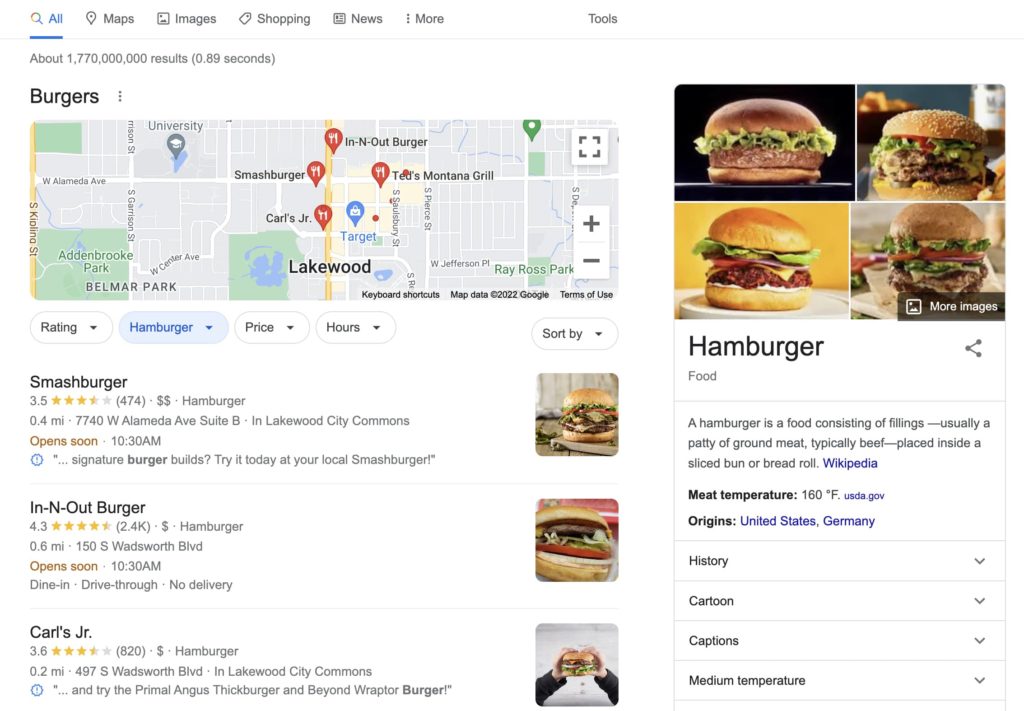
The name recognition of these big corporations exemplifies the importance of prominence in local search. Behind the scenes, these businesses also have the marketing budget and SEO infrastructure to stand out in search.
Small and medium-sized businesses can build their own prominence through local search marketing. However, the more you Google yourself and click on competitors’ results, the stronger the signal you send to Google that the competition should be treated as more prominent (and therefore ranked ahead of your business).
7. Paid Ads Impressions
The adverse effects of excessive self-searching are not limited to organic search. PPC campaigns run on keywords, too. Often, the search terms businesses prize the most when it comes to ranking in organic are also highly valuable from a paid perspective.
Google notices when users don’t click on the PPC ads served for a particular keyword. The more you search and don’t click on your ads, the less likely your ads are to show up when potential customers perform these same searches.

How Googling Yourself Can Be Good for Your SEO
Many a marketing consultant has tried to convince clients not to Google themselves. When they are displeased with the results they see, it often falls on the marketing agency to talk clients off the ledge and explain why the tactic is counterproductive.
That said, you can make Googling yourself work to benefit your SEO if you treat your results and pages like you would a competitor’s.
- Sign out of any Google accounts and clear your browser history; this will avoid skewing the search results based on your previous searches, the websites you visited, etc.
- Try searching from a location other than your home and office, such as when you are out at a restaurant
- Click on your page in the SERPs
- View the page and the website the way a user would; read text, look at images, play videos, and click on links
- Stay on the page and your site; this could be a simple as just leaving the page up and opening a new tab to go about your day
(NOTE: You should not click on PPC ads for your business, as this wastes your pay-per-click budget.)
What’s good for the goose is good for the gander, as the saying goes. If inverting the usual approach to Googling yourself using the steps above can help your SEO, doing the opposite can knock your competition down a peg.
Clicking a competitor’s result and immediately leaving the page is a simple way to put a damper on their SEO. Some companies even employ this tactic (known as click-through rate or CTR manipulation) on a grand scale in an effort to boost customers’ SEO and/or keep competitors lower in the rankings.

Stop Hurting Your SEO: Get Expert Search Marketing Advice Today
The value of Googling yourself and keywords related to your business will likely continue to be the subject of debate. Business is competition, and it is natural to want to know what your competitors are doing and the results they achieve.
Unfortunately, many businesses undermine their SEO through their efforts at search reconnaissance. Radiohead put it best: “You do it to yourself, you do / And that’s what really hurts.”

Working with a knowledgeable SEO marketing agency can help you get the insights you need on how you and your competitors are ranking without succumbing to the temptation to self-Google. At Twelve Three Media, we use a three-point process to help our clients dominate the search rankings:
- PLAN. We get to know your business intimately and perform comprehensive keyword research to identify the keywords and queries that drive success.
- TARGET. Based on the research, we optimize your website and other aspects of your marketing to boost your presence in search results.
- VALIDATE. Finally, we check our work. Our team dives deep into the data to determine what’s working, what needs improvement, and how our efforts have improved your rankings. You can rely on us to be truthful and provide actionable insights.
Our SEO experts have the knowledge, skill, and data savvy you need to start climbing the rankings and standing out to your customers. Gain the unfair marketing advantage with SEO services at Twelve Three Media today!
